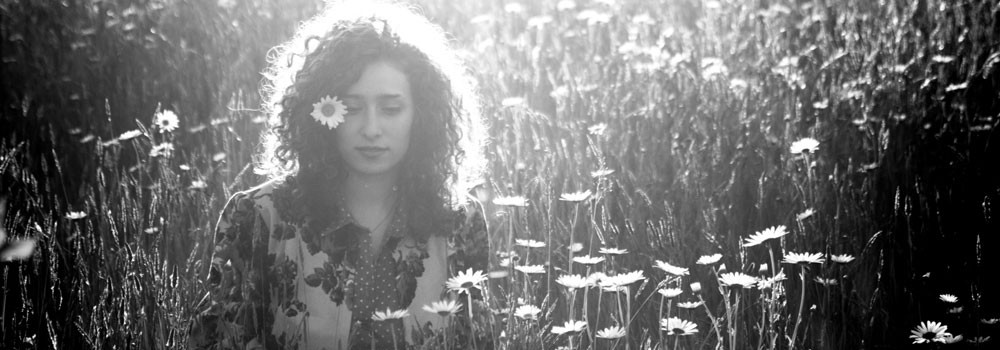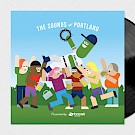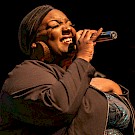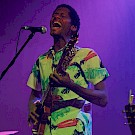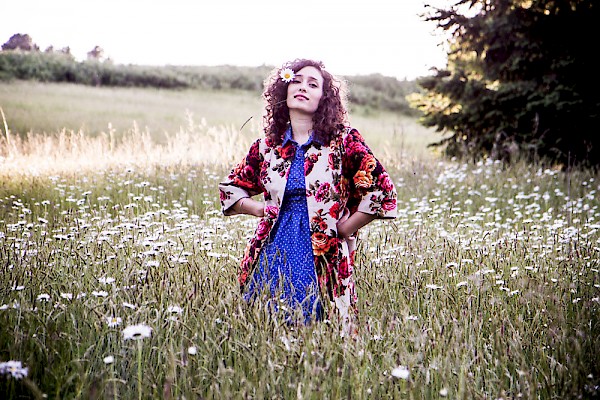 Ms. Masa: Photos by Tor ClausenIt’s a windy night as I climb the porch to a pale yellow house, the color of first daffodils in spring—a spring that’s come early to Portland. Moorea Masa greets me warmly and invites me into her kitchen for tea as she finishes cooking a meal for herself. A smallish cat named Hafiz, a nod to the Sufi mystic and poet, paces around, mewling for the food dish to be filled. In between bites and the wayward, headbutting affections of Hafiz, Masa tells me tales of her family, her musical travels, her new soul-folk EP, Oh Mother, and how a soul singer comes to be named after a beautiful, heart-shaped island in French Polynesia called Mo'ore'a, which means "yellow lizard" in Tahitian.
Ms. Masa: Photos by Tor ClausenIt’s a windy night as I climb the porch to a pale yellow house, the color of first daffodils in spring—a spring that’s come early to Portland. Moorea Masa greets me warmly and invites me into her kitchen for tea as she finishes cooking a meal for herself. A smallish cat named Hafiz, a nod to the Sufi mystic and poet, paces around, mewling for the food dish to be filled. In between bites and the wayward, headbutting affections of Hafiz, Masa tells me tales of her family, her musical travels, her new soul-folk EP, Oh Mother, and how a soul singer comes to be named after a beautiful, heart-shaped island in French Polynesia called Mo'ore'a, which means "yellow lizard" in Tahitian.
Masa’s Italian father and German-born mother both worked on a cruise ship in their youth. “My grandmother asked them, ‘Well, what was your favorite island?’” It was the one they met on—the island of Mo'ore'a—that became the name they gave their child.
“Traveling is just in my blood I think. As soon as I was 18, I was like, ‘I want to get as far away from here as possible, and I want to explore the world,’ so I went to Liverpool.” Masa studied at The Liverpool Institute for Performing Arts but decided to leave school early, backpacking and hitchhiking her way across Europe alone and with a friend.
Then there was the time she lived in a cave with Flamenco musicians.
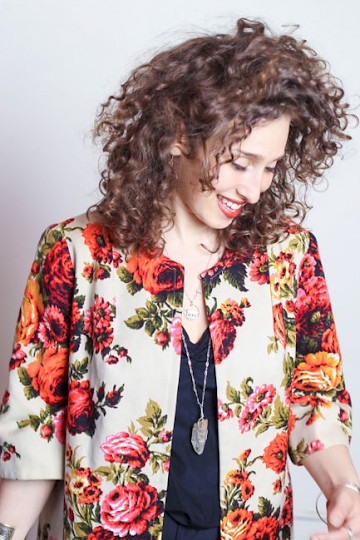 “When I quit school, I wasn’t moving back home. I decided to move somewhere for a little while where I could just be and write music and process all these major life decisions I’d been making, and to do that somewhere in nature. So, I moved to Granada in the south of Spain. I lived in a cave for half a year and the people I lived with were Flamenco musicians. I love Latin music and I went down this rabbit hole from there. I don’t sing Spanish music but it will come out in subtle ways.”
“When I quit school, I wasn’t moving back home. I decided to move somewhere for a little while where I could just be and write music and process all these major life decisions I’d been making, and to do that somewhere in nature. So, I moved to Granada in the south of Spain. I lived in a cave for half a year and the people I lived with were Flamenco musicians. I love Latin music and I went down this rabbit hole from there. I don’t sing Spanish music but it will come out in subtle ways.”
Whether the training was formal or rustic, there was never any doubt that Masa would find her way to music.
“I wanted to be a singer since I could talk. There was never a point where I’ve thought of doing anything else. I love all types of art—visual art, writing, and I did photography for a really long time, but all related to music. I even did photography for a music magazine while I lived in Liverpool.”
Before college, Masa’s early work resumé was similarly brief, but still managed to be musical. She tried her hand at working a regular teenager job, scooping ice cream and singing for tip money at Cold Stone Creamery.
“Oh yeah,” she reflects, “I thought, ‘I could try this, ‘cause it’s fun. Isn’t this what I’m supposed to do as a 16 year old?’” But she realized very young, there was no other choice.
“This is why I’m never going to do this,” Masa growls in a surly, teenage voice. “I’m gonna sing. That’s my career!”
Masa is similarly reluctant to recall her early days on the American Idol circuit. “I forget that people can look that up on the internet,” Masa whispers. “I had just turned 16 and I had no idea.” She had watched the show and with the support of her father, she auditioned.
“It was a great experience,” Masa says brightly, then her tone darkens, “in that it opened my eyes to the part of the industry that I want nothing to do with.”
Work wasn’t going to afford or allow her a singing career, education wasn’t necessarily going to teach her how to do it, and becoming a household name by competing and traveling the highly visible, televised road to stardom was a soulless venture. For Masa, it would mean finding her own way and simply being a singer-songwriter on her own terms.
When she returned from her travels, Masa concentrated on a band she started in Portland with longtime friend Michael Backus. The Ruby Pines—a soul-folk-indie duo—lasted six years and released a home-recorded EP, but stopped short of completing and recording an album.
 Enter the next chapter: Ural Thomas & the Pain.
Enter the next chapter: Ural Thomas & the Pain.
Masa attended an opera with friend Ben Darwish (Morning Ritual, Mackintosh Braun, Reva DeVito) who introduced her to Scott Magee, the band leader for Ural Thomas & the Pain, who had been scouting around for backup soul singers in Portland. Masa had expected to audition a few days later, but sight unseen and sound unheard, she launched straight into band rehearsals instead.
“It came at such a good time. I had just broke up with my band, and I thought, ‘Oh, I can figure out what I’m doing with myself and I can still have fun with this other thing that I’m doing.’ Ural is one of the most special people I’ve ever met—I get to perform with somebody who is really inspiring every time I sing next to him. So many doors have opened... it’s such a joyous thing.”
You could even say, that from there, one door closed and several others opened.
Soon, Masa met Jon Neufeld, guitarist for Black Prairie (and also of Dolorean and Jackstraw), who she has since been writing and performing with. After introductions at a benefit concert for the Children's Cancer Association, where Ural Thomas, Black Prairie and other local musicians shared the stage, Masa was invited to sing backup vocals on "Carolina Low" and "Till The Water's All Long Gone" (listen below) on The Decemberists latest album What a Terrible World, What a Beautiful World.
 “I’ve been a fan of The Decemberists for a really long time,” Masa beams. “Even though I’m young, I saw so many Portland shows and saw them sing at the Obama rally and I was so humbled and honored to be considered. To be able to work with them was such a special experience, and now they’re lovely friends of mine.”
“I’ve been a fan of The Decemberists for a really long time,” Masa beams. “Even though I’m young, I saw so many Portland shows and saw them sing at the Obama rally and I was so humbled and honored to be considered. To be able to work with them was such a special experience, and now they’re lovely friends of mine.”
Ultimately Masa turned back to finishing her own recording, Oh Mother. Released this past February, it’s a collection of long-lived, oft-performed songs finally rendered and packaged, and it represents her first solo release. They’re all written by Masa, except for “Send Me Your Lovin’,” a nod to Sam Cooke’s “Send Me Some Lovin’.”
“This EP was such a labor of love. It was just my dear friends all working on it because they believe in it and they enjoy the music.” Backup singers and friends Margaret Wehr (Promise the Moon) and Allison Hall (Goose & Fox) weave pitch-perfect harmonies throughout while Jimmy Russell (The Quick & Easy Boys) played guitar on every track except one, allowing Masa to concentrate on singing.
“I really wanted it to be an album that you listen to as a short glimpse of time, but as a full piece of art. I think that the songs stand on their own, but they’re much stronger together.”
Oh Mother opens with the hymnal-sounding invitation “Follow Me Down” and ends with the brief song “New Moon”—like a poem and a prayer. “I like the idea of starting an album acapella and ending with the voices—sort of taking the listener on a journey,” Masa explains.
“Five Birds,” a standout track on Oh Mother, is about a transformational journey—a return to nature and how Masa escaped the chaos of the city and spent a magical, restorative day with a few close friends under a circle of trees in central London’s Green Park. “It was such a special day where we all got to breathe—a very cleansing, centering day of getting out of the city. It felt like we lost track of time together. Afterwards, I wanted to write a song that would help me come back to that place—that ‘coming undone’ and shedding of skin and layers. It was probably the first song I ever wrote on guitar on my own and it felt very much me and very personal.”
The birds come in as a secondary source of symbolism and tone on Oh Mother. The EP artwork bears a written and visual dedication to a recently lost, motherly friend of Masa’s, Marcia Jean Barrentine. Masa had the cover art done in her memory while consulting, researching and collaborating with Barrentine’s daughter, Madeleine.
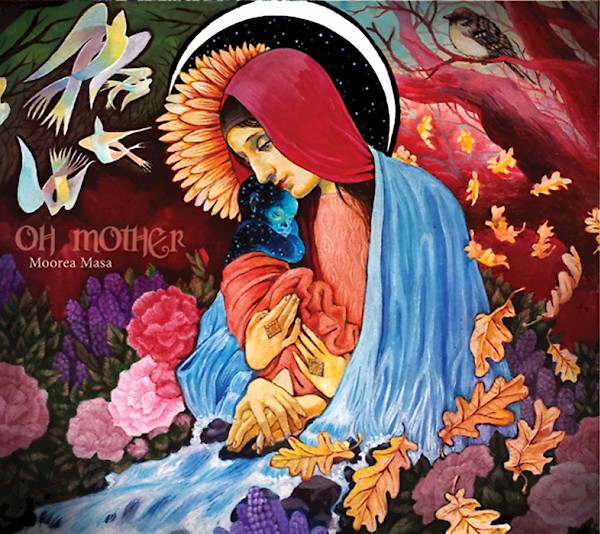 Artwork by Ila Rose“The cover has these birds on it that Marcia use to make and hang in her studio.” Five likenesses of those paper birds flit across the scene of a Madonna and Child in a divided forest—springtime greenery and flowers on one side and bare, red, arterial branches showering down golden leaves on the the other. The Madonna is five-handed and she cradles an indigo child imprinted with stars of the cosmos. A sky blue mantle drapes her shoulders and flows down, evolving into a waterfall rushing over black stones.
Artwork by Ila Rose“The cover has these birds on it that Marcia use to make and hang in her studio.” Five likenesses of those paper birds flit across the scene of a Madonna and Child in a divided forest—springtime greenery and flowers on one side and bare, red, arterial branches showering down golden leaves on the the other. The Madonna is five-handed and she cradles an indigo child imprinted with stars of the cosmos. A sky blue mantle drapes her shoulders and flows down, evolving into a waterfall rushing over black stones.
“Everything became a way to honor her and process her passing. Music is healing and it was a way to direct the grieving process. ‘Take Me Back’ was written after she passed, and while those songs weren’t for her when I wrote them, they took on that meaning afterwards, so these are for her.” Indeed, the lyrics to “Take Me Back” are beautifully referential to the cover art with “waters deep,” “autumn leaves,” and “birds flying high, I will remember you, how could I forget?”
Oh Mother features Masa’s R&B-tinged passion over tender folk strains of acoustic guitar and violin—a contrast she acknowledges.
“It’s interesting that I’ve always been a soulful singer, but I’ve never been in a soul band before. I love that music so much, but I’ve never been in a 10-piece band. So when people come to see me with Ural Thomas and then come see me and it’s pretty stripped back—it’s so different. Right now, I’m on this ride, developing my solo stuff which feels really empowering. I’ve only been playing the guitar out for the last year. I played my first show last December and I feel like I’m figuring out who I am when it comes to music.”
Masa explores her voice and instructs others to do the same by teaching to support her music career. She recently began a series of voice workshops geared specifically toward women.
“I’m really excited that I can empower women. It’s such a beautiful thing and I’m so excited that I can do it in a group setting. I love one-on-one, but I think it’s so much more powerful when you’re all in it together—you’re in front of nine people who are there with you and holding you accountable and it doesn’t have to be something that you do to make money.”
Given Masa’s musical journey, it’s never been about making money from music, that much is clear. It’s about the sense of musical community and the support to do what she loves.
“The fact that I get to do music and share it with people on any level is amazing. My friends and family are really supportive and my parents come to all of my shows.” Masa pauses and smiles, “It’s really cute. Sometimes they sit in the front row, and I can’t look at my father if I know I’m hitting a wrong note, but I wouldn’t have it any other way.”
At 22, Moorea Masa has packed an incredible amount of learning, living, traveling and talent into such a brief time, singing backup with prominent Portland musicians and songwriters as well as working on her own projects. Oh Mother represents a mending and completion of a cycle on many levels. (Listen to the title track below.)
“I’m really happy with how the songs came out. I’m really glad that I did them, since I’ve never been able to release these songs—to give them to people and put the album out there. These are older songs to me now, but all the pieces came together at the right time. It was natural and meaningful and I feel so proud of it. I finished it, and now I can move on. There’s this whole release and it feels like the beginning. I’m so excited to be writing with Jon [Neufeld] and to do all of this on my own. I’m ready,” she smiles,” and I’m on to something else.”

